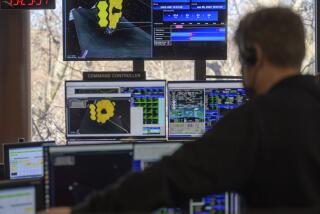Lawmaker urges Northrop workers to protest military budget cuts
- Share via
With proposed federal budget cuts threatening military contracts and employment in Southern California’s aerospace industry, about 2,000 Northrop Grumman Corp. workers were urged by a powerful congressional supporter to fight to save industry jobs.
“I implore you, no, I beg you, to stop this from happening,” Rep. Howard “Buck” McKeon (R-Santa Clarita) exhorted workers Monday morning during a rousing speech at Northrop’s sprawling manufacturing plant in Palmdale, where it built the B-2 stealth bomber.
As chairman of the House Armed Services Committee and representing an aerospace industry-rich district, McKeon has been an ardent supporter of the defense industry in Congress. He urged workers, their families and their supporters to call members of Congress to urge restraint in the proposed cuts, estimated at $487 billion over the next decade.
“Stage an insurrection in this country,” he told the cheering crowd. “When you leave here today call … your loved ones” to help support the industry.
The $487 billion in cuts are what the Pentagon and White House agreed on last summer, but there are nagging worries in the aerospace industry that Congress will cut as much as $600 billion more.
In such a scenario, the Aerospace Industries Assn., an Arlington, Va., trade group, estimated 1 million jobs of all kinds would be lost nationwide, including 126,000 in California.
“These cuts can be stopped or averted,” McKeon said.
The cuts come as the Obama administration winds down two wars and after a decade of heady growth amid one of the biggest military buildups in decades following Sept. 11, 2001.
For example, the aerospace association’s preliminary numbers for 2011 show the industry had record sales of $218.1 billion that included federal military spending, NASA outlays, foreign military sales and commercial sales.
But with the military spending slated to tighten, the industry expects a long stretch of cuts in weapons purchases and has been laying off workers in waves.
“The cuts are real,” McKeon said. “And we’ve already begun to feel the effects.”
In January 2011, Boeing said it was cutting 900 jobs at its sprawling Long Beach plant, where it builds C-17 cargo jets. In June, Lockheed Martin Corp. announced that it was cutting about 1,500 positions across its aeronautics business, including jobs in California. In August, Northrop said it was cutting 500 jobs in its aerospace division, which is spread throughout the Southland.
McKeon spoke in front of Northrop’s RQ-4 Global Hawk, a high-tech spy drone that’s been part of the Air Force since 2001. One version of the drone, which is made at the Palmdale plant, was set for an early retirement because the Air Force said it cost too much to operate.
“Despite early predictions, the savings anticipated by the use of Global Hawks have not come to fruition, and we will not invest in new technology at any cost,” Air Force Chief of Staff Gen. Norton A. Schwartz said to the House Armed Services Committee in February.
Instead, the Air Force will continue fly its Cold War-era war horse, the U-2 spy plane. Schwartz told Congress it would save the Air Force $815 million in fiscal 2013 and $2.5 billion over the next five years.
The fleet of 33 U-2s made by Lockheed was slated for retirement by the end of the decade. Now the program could fly well beyond 2020.
McKeon told Northrop employees that the decision was made because the U-2 was cheaper, not because it presented the military with a more-capable option.
“The current strategic outlook is a tangled mess,” he said. “Things in Washington are not great.”
More to Read
Inside the business of entertainment
The Wide Shot brings you news, analysis and insights on everything from streaming wars to production — and what it all means for the future.
You may occasionally receive promotional content from the Los Angeles Times.











